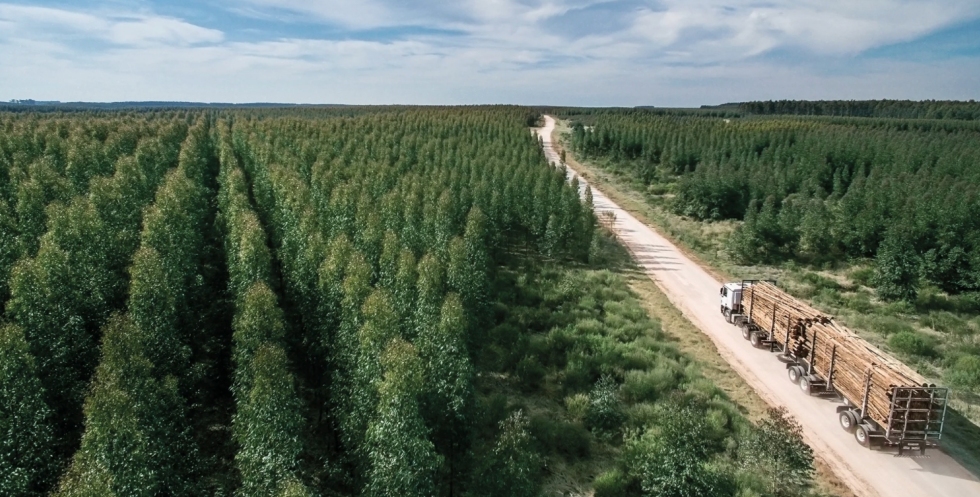|

UPM Pulp Takes on North America with New Eucalyptus Pulp Volumes
Powered by a new pulp mill, UPM is poised to make a big play on the North American pulp market.
By Sami Anteroinen for UPM
Feb. 1, 2022 - With a eucalyptus pulp boost from the Paso de los Toros mill in Uruguay, scheduled to start-up in the first quarter of 2023, UPM Pulp is ready to take on a completely new market in North America. Lajos Forster, Sales Director, New Markets, comments that the company started its market entry already in 2021.
“With the additional Euca volume, we are ready to develop UPM Pulp into a global market pulp supplier. Therefore, a presence in the third biggest pulp market in the world is just a logical consequence on our journey,” says Forster.
Forster notes that UPM Pulp has successfully established itself as a reliable player in the Asia-Pacific region and Europe during the previous decade and is now using this experience to develop its third strategic market.
“Of course, a new supplier in a market always creates some expectations, but we got the impression that there is room for a player that can offer a leading sustainability performance including the most common forest certifications, supply security because of our soon two mills, and our excellent logistics network.”

Logistical Edge
Talking about those logistics — especially rail deliveries — Forster points out that they are quite complex in North America.
“Our experience in the supply chain management for UPM’s Paper and Label materials businesses in North America will also benefit UPM Pulp to provide superior and competitive logistics solutions to our customers. We don’t start from scratch and have been a well-established player there for years,” he says.
Furthermore, UPM’s eucalyptus pulp is coming from Uruguay, a country that has never cut rainforest to establish eucalyptus plantations. “Our trees grow on former grassland,” confirms Forster.
As for UPM Pulp’s goals for the North American market, the answer, and target, is clear: “We aim to become the second largest supplier of eucalyptus pulp to the North American market by 2025.”
The Right Setting for Success
Looking ahead, Forster believes that the market will grow moderately with tissue as one of the drivers. The consumption will still increase, but also the shift from recycled fibre based tissue to virgin fibre tissue will have a positive impact on the demand of eucalyptus pulp.
“We also see a lot of interest in eucalyptus from other end uses that currently use mixed hardwood as their hardwood fibre,” Forster comments.
According to him, the biggest challenge involves building an environment where UPM’s customers see the company as their preferred supplier.
“We will be able to achieve this with a very professional sales & logistics team with an outstanding service level mindset and deep knowledge about the pulp market,” he sums up.
Reshuffling the Deck
Brian McClay, Principal consultant at Brian McClay & Associates, says that UPM’s entry into the North American Bleached Eucalyptus Kraft (BEK) market is a significant development, and will reshuffle the dynamics of the North American market.
“Bleached Eucalyptus Kraft consumption in North America is dominated by the tissue market, and most of the major buyers have contractual relationships and value stability, certification, R&D and strong technical support, all of which UPM is well placed to provide. We expect that UPM will be a welcome addition to this market,” comments McClay, who counts UPM among the industry’s leading companies.
“UPM is innovating, investing in high-quality assets, and effectively reporting on its sustainability performance,” he says.
Better Geographic Balance?
McClay notes that North America has seen growth in the tissue market and decline in the printing and writing market over the last decade, and these trends are likely to continue.
“For BEK, tissue accounts for nearly 90% of demand, so we can expect BEK demand to grow in line with tissue demand growth, which tends to track with GDP growth. The North American tissue consumer prefers soft, high-quality tissue made on through-air-dry (TAD) machines, and BEK is the preferred hardwood fibre.”
North American paper production and pulp demand is heavily concentrated in the eastern part of the US, but McClay expects to see more tissue capacity additions in the coming years in areas of the south and west, as well.
“The North American market can be a challenge for suppliers because customers expect pulp to be delivered to their mill door, and the freight costs are often shockingly high to certain locations, which can present problems to new entrants.”
Increasing Competition
Nevertheless, in the coming years McClay expects Latin American and European producers to gain market share at the expense of domestic integrated and non-integrated suppliers.
“In general, pulp mills in North America are smaller, older, and less consolidated than those in Europe and Latin America, and, as such, tend to be higher on the global cost curve.”
SOURCE: UPM |